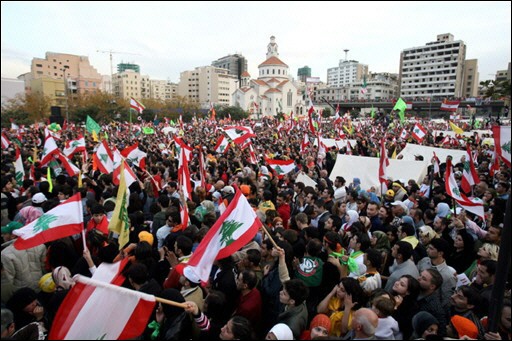United protests put Lebanese government on the defensive
Ghassan Makarem, a Lebanese activist, speaks from Beirut about the huge protests that have rocked the Lebanese capital
Beirut has become the focus of a new movement that is challenging the US-backed government and the political system that put them in power.
This movement was launched by the biggest ever demonstration in the country’s history. Over one million people – out of a population of 4 million – converged on the Lebanese capital on Friday of last week to demand the formation of a government of national unity.
Trucks, buses and cars were packed with protesters, while families marched from the poor neighbourhoods that ring the capital.
The monster demonstration has been followed up by an occupation of the city centre. A sea of tents – some from villages, others from neighbourhoods and political parties – have sprung up as protesters lay siege to government buildings.
Every evening over 50,000 people turn out for rallies, speeches and discussions.
Now national institutions have joined the campaign. Universities have set up tents and hosted lectures, while meeting tents have become centres for political debate.
The government – an alliance of sectarian parties – is threatening to unleash a civil war if the protests continue. The followers of billionaire political boss Saad Hariri opened fire on one group of protesters.
One young metal worker was killed. Despite the killing the government’s attempt to inject the poison of sectarianism into the daily demonstrations has backfired. The protests have become more mixed.
Despite the provocations, the protesters have refused to retaliate.
The organisers – Hizbollah and other Shia Muslim parties, the Communists and the overwhelmingly Christian Free Patriotic movement – have been joined by Sunni Muslim parties opposed to the government.
Many Sunni Muslims from Beirut have joined the demonstrators as the movement has broadened.
The protests have captured the imagination of people who were sickened by the government’s inaction in opposing Israel’s assault on the country in the summer – and heartened by the popular support for the resistance.
However they are raising questions about a strategy that simply wants to redistribute power among the religious groups.
Opposition leaders want a compromise and are demanding a government of national unity.
But the momentum created by the protests is now raising more far reaching demands.
Official chants calling for national unity have given way to calls for the end to the sectarian system and corruption, a rise in wages and denunciations of a new tax that hits the poor.
As the protests enter the second week, the government has become more isolated, yet the danger remains that compromise would squander the tremendous power for change created by the mass protest.
——————————————————————————–
© Copyright Socialist Worker (unless otherwise stated). You may republish if you include an active link to the original and leave this notice in place.



